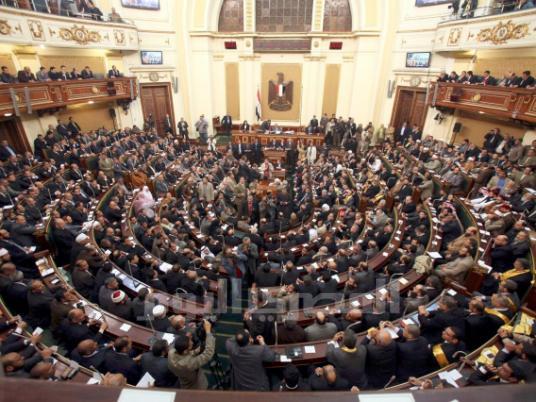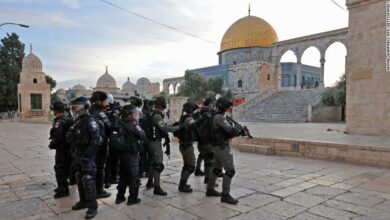
Parliamentary sessions this week were predominantly occupied with a war of semantics, with feuds erupting over insults and apologies for them.
And where there is hysterical slander, there is Mostafa Bakry. Fresh from slandering reform leader Mohamed ElBaradei in a previous session by calling him an American agent, independent MP Bakry was in fine form as the People’s Assembly convened on Sunday.
In the space of a few minutes, Bakry managed to attack civil society groups, calling them boutiques, whilst singing the praises of “patriotic minister” Fayza Abouelnaga for dealing with the “dirty” intervention in Egyptian affairs through the foreign funding of civil society. Barely waiting for breath, Bakry then launched a tirade against Egyptian Social Democratic Party MP Zyad Elelaimy for comments he made in which he used a proverb about a donkey and a cart to criticize Field Marshal Hussein Tantawi, head of the ruling Supreme Council of the Armed Forces.
Elelaimy would land in hot water over these bravado-infused comments, which he made in Port Said. He would look less confident the following day when making a statement to the assembly. His comments ruffled many MPs feathers, and they demanded some sort of law be passed against MPs insulting state institutions.
The following day there was a continuation of events, with Elelaimy stumbling over a prepared statement in which he said he saw no shame in apologizing to MPs and the people if they thought he was wrong, stopping short of an outright apology.
This angered a large group of Brotherhood and Salafi MPs who continued shouting at Elelaimy. As Speaker Saad al-Katatny was hoping to draw a close on the matter, he asked Elelaimy to repeat his comments, to much consternation from the angry MPs. Katatny stated that his interest was in protecting an MP.
Elelaimy’s statement had been agreed upon between some MPs the day before and so the expectation was that it would be accepted in the assembly. It was called for a vote, not once, not twice but three times. As opposed to the usual raising of hands, this vote was so contentious that people were standing up or sitting down depending on their stance.
The motion to accept Elelaimy’s apology was eventually not passed, and Katatny’s face was troubled as he announced it. Therefore Elelaimy was referred to the ethics committee for further action to be taken.
The following day, Adl MP Mostafa al-Naggar announced that he had collected the signatures of 30 MPs to file a motion against Bakry, who claimed ElBaradei was a US agent intent on destroying Egypt. The request was to refer Bakry to the ethics committee, as the Elelaimy case now sets a precedent for such things.
This wasn’t the only fracas to ensue under the parliamentary dome last week. On Sunday, the assembly was discussing unemployment, with 46 motions to be heard on the subject. One Nour Party MP, Mohamed Ali Abdallah quipped, “Is the government serious about solving unemployment or does it want to decrease the number of Egyptians?”
In attendance was the Minister of Supply and Social Affairs Gouda Abdel Khaleq, who was responding to the motions on behalf of the government. Abdel Khaleq started off by admitting that unemployment was a serious issue the government was facing, but he stated that he took issue with Abdallah’s comment and asked for it to be removed from the assembly log.
His admonishment caused great uproar in the assembly, but things got extremely heated when Abdel Khaleq told the MPs to sit down. All hell then broke loose.
MPs were livid that Abdel Khaleq had told them to sit down. An extremely irate MP ran up to Abdel Khaleq, who was standing at the podium below Katatny, and screamed “I’m an elected official; don’t tell me to sit down.” The commotion was so great that Katatny asked Abdel Khaleq to sit back down, and then he said that no minister had the right to comment on an MPs opinion. He also requested the attendance of the manpower minister to answer MP questions on unemployment.
In committee news, head of the Health Committee and FJP MP Akram al-Shaer addressed the assembly before the close of Sunday’s evening session.
He spoke about the committee’s report on the lack of protamin sulphate in Egypt, a drug that is required for conducting of open-heart surgeries, the shortage of which is currently holding up surgeries in major hospitals across the country. It is produced by only one manufacturer in Egypt, EIPICO, which stopped manufacturing it last November.
The reason EIPICO gave is that a vital ingredient needed for the production of the drug is imported from Japan, and because of the earthquake and radioactive fallout that occurred there last March it has been hard to procure.
Shaer, however, was not convinced, and accused EIPICO of wanting to raise the subsidized price of the drug, which is LE3 per ampoule. He also said that there shouldn’t be a monopoly on the manufacture of such a vital drug in Egypt.
Shaer also said that the committee had obliged the Health Ministry to import 28,000 ampoules of the drug immediately and that the batch had arrived that day.
On Sunday, head of the engineering department of the Interior Ministry told the Defense and National Security Committee that 1.3 million acres of Egyptian land had been cleared of landmines since the return of the Sinai Peninsula to Egypt. This was in response to a request from the committee to implement a national project to remove all remaining mines nationwide.
Monday’s session was devoted to discussing the Health Committee’s report about whether or not Tora Prison Hospital was prepared to receive ousted President Hosni Mubarak. The report concluded that the Liman Tora Hospital was suitable for holding the former head of state. However, Tagammu MP Al-Badri Farghaly pointed out that it is the public prosecutor who decides where Mubarak should be held, while FJP MP Adel Afify said that it was the court’s decision and Parliament should not interfere in the judicial process. However, Parliament could request his relocation in the name of the Egyptian people. During the Wednesday court session of the Mubarak trial, the presiding judge ruled against Mubarak’s transfer to Tora.
Amid this discussion, Nour party MP Younes Makhyoun requested that the assembly discuss a block on all pornographic internet sites in Egypt. Decrying it as an evil that doesn’t conform to Egypt’s religious and social morals, Makhyoun also said that a ban would not contravene freedom of expression as it is criminalized by Egyptian law.
On Monday, the Arab Affairs Committee discussed the situation in Syria and member Khaled Hanafy of the FJP said that the Egyptian Parliament was supportive of Syrians and other Arab revolutions and that Bashar al-Assad’s regime “has lost its legitimacy through the massacres it has committed and its dark history.”
The committee laid out how Egypt’s ambassador to Syria would be withdrawn and discussed plans to request that the Foreign Ministry pressure Russia and China, to receive the Syrian opposition at the Arab League headquarters in Cairo and to support aid being sent to Syria.
An important topic that was discussed during the Monday afternoon session was an amendment to Labor Law 23 from 1978, which stipulates how long an employee can work in the government before being given a permanent contract. This addresses a longstanding complaint of many employees, who have been working for years in government sectors such as ambulance services and have not been permanently hired. The law in its current form gives the government a three-year period before offering permanent contracts. Parliament wants to amend that period to six months.
In the evening session on Monday the assembly heard 11 motions regarding the theft of radioactive material from the Dabaa construction site, which is intended to be the site of the first nuclear reactor in Egypt. Electricity Minister Hassan Younes addressed the assembly and admitted that low-grade samples of radioactive material were stolen from the labs on 17 January. However, a committee was sent to the site two days later and concluded that radioactive levels were not high and were at base level. Meanwhile, members of the Defense and National Security Committee held the armed forces responsible for securing the construction site.
A controversy loomed in Parliament this week over the judicial immunity of the Presidential Elections Commission, as dictated by Article 28 of the Constitutional Declaration. MP Mahmoud al-Khodeiry, head of Parliament’s Legislative Committee, has said the article cannot be changed, to the ire of MPs who think the article will jeopardize the fairness of the presidential election process.
The controversy follows a pledge by the Constitutional and Legislative Affairs Committee to review all laws passed by the ruling military council before the Parliament convened, which include Al-Azhar law, the presidential elections bill and the development of North Sinai bill, alongside others.




